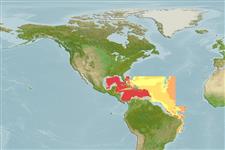Teleostei (teleosts) >
Scombriformes (Mackerels) >
Bramidae (Pomfrets)
Etymology: Eumegistus: Greek, eu = good + Greek , megistos, -e, -on = very big, powerfull (Ref. 45335).
Eponymy: James Carson Brevoort (1818–1887) was an American collector of coins and rare books. [...] (Ref. 128868), visit book page.
More on author: Poey.
Environment: milieu / climate zone / depth range / distribution range
Ecology
Marine; bathypelagic; depth range 384 - 1317 m (Ref. 82736). Deep-water; 29°N - 16°S, 95°W - 32°W
Western Central Atlantic: Bahamas, Carribean Sea, Gulf of Mexico, Colombia and Venezuela. Southwest Atlantic: Fernando de Noronha Archipelago and Bahia, Brazil.
Size / Weight / Age
Maturity: Lm ? range ? - ? cm
Max length : 61.0 cm FL male/unsexed; (Ref. 40637); max. published weight: 3.1 kg (Ref. 40637)
All adults have been taken from off large islands (Ref. 4936). Meso/bathypelagic species (Ref. 82736). Feeds on fishes, crustaceans, cephalopods and worms (Ref. 82736).
Life cycle and mating behavior
Maturity | Reproduction | Spawning | Eggs | Fecundity | Larvae
Gomes, J., 1990. Bramidae. p. 758-764. In J.C. Quero, J.C. Hureau, C. Karrer, A. Post and L. Saldanha (eds.) Check-list of the fishes of the eastern tropical Atlantic (CLOFETA). JNCT, Lisbon; SEI, Paris; and UNESCO, Paris. Vol. 2. (Ref. 4936)
IUCN Red List Status (Ref. 130435: Version 2024-1)
Threat to humans
Harmless
Human uses
Gamefish: yes
Tools
Special reports
Download XML
Internet sources
Estimates based on models
Preferred temperature (Ref.
123201): 6.1 - 12.5, mean 8.4 °C (based on 88 cells).
Phylogenetic diversity index (Ref.
82804): PD
50 = 0.7500 [Uniqueness, from 0.5 = low to 2.0 = high].
Bayesian length-weight: a=0.01995 (0.00906 - 0.04395), b=3.01 (2.83 - 3.19), in cm total length, based on all LWR estimates for this body shape (Ref.
93245).
Trophic level (Ref.
69278): 4.5 ±0.61 se; based on food items.
Resilience (Ref.
120179): Medium, minimum population doubling time 1.4 - 4.4 years (Fec > 10,000).
Fishing Vulnerability (Ref.
59153): Moderate to high vulnerability (47 of 100).
